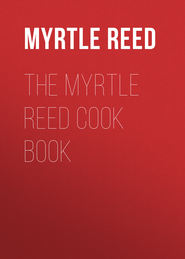По всем вопросам обращайтесь на: info@litportal.ru
(©) 2003-2024.
✖
Threads of Grey and Gold
Настройки чтения
Размер шрифта
Высота строк
Поля
A merry laugh reaches his ear, and he turns around. The tall brother is chasing her through the bushes, and she waves a letter tantalisingly at him as she goes, and finally bounds over a low fence and runs across the field, with her big brother in close pursuit. “Hoydenish!” and Mr. Ideal hums softly to himself and goes off to find Smith. Smith is a good fellow and asks Mr. Ideal to go fishing. They go, but don’t have a bite, and come home rather cross. Does Smith know the little red-headed girl who was on the piazza this morning?
Yes, he has met her. She has been here about a week. “Rather nice, but not especially attractive, you know.” No, she isn’t, but he will introduce Mr. Ideal.
Days pass, and Mr. Ideal and Miss Practical are much together. He finds her the jolliest girl he ever knew. She is an enthusiastic advocate of “woman” in every available sphere.
She herself is going to be a trained nurse after she learns to “keep house.” “For you know that every woman should be a good housekeeper,” she says demurely.
He doesn’t exactly like “that trained nurse business,” but he admits to himself that, if he were ill, he should like to have Miss Practical smooth his pillow and take care of him.
And so the time goes on, and he is often the companion of the girl. At times, she fairly scintillates with merriment, but she is so dignified, and so womanly – so very careful to keep him at his proper distance – that, well, “she is a type!”
In due course of time, he plans to return to the city, and to the theatres and parties he used to find so pleasant. All his friends are there. No, Miss Practical is not in the city; she is right here. Like a flash a revelation comes over him, and he paces the veranda angrily. Well, there’s only one thing to be done – he must tell her about it. Perhaps – and he sees a flash of blue through the shrubbery, which he seeks with the air of a man who has an object in view.
His circle of friends are very much surprised when he introduces Mrs. Ideal, for she is surely different from the ideal woman about whom they have heard so much. They naturally think he is inconsistent, but he isn’t, for some subtle alchemy has transfigured the homely little girl into the dearest, best, and altogether most beautiful woman Mr. Ideal has ever seen.
She is domestic in her tastes now, and has abandoned the professional nurse idea. She knows a great deal about Greek and Latin, and still more about Shakespeare and Browning and other authors.
But she neglects neither her books nor her housekeeping, and her husband spends his evenings at home, not because Mrs. Ideal would cry and make a fuss if he didn’t, but because his heart is in her keeping, and because his own fireside, with its sweet-faced guardian angel, is to him the most beautiful place on earth, and he has sense enough to appreciate what a noble wife is to him.
The plain truth is, when “any whatsoever” Mr. Ideal loves a woman, he immediately finds her perfect, and transfers to her the attributes which only exist in his imagination. His heart and happiness are there – not with the creatures of his dreams, but the warm, living, loving human being beside him, and to him, henceforth, the ideal is the real.
For “the ideal woman is as gentle as she is strong.” She wins her way among her friends and fellow human beings, even though they may be strangers, by doing many a kindness which the most of us are too apt to overlook or ignore.
No heights of thought or feeling are beyond her eager reach, and no human creature has sunk too low for her sympathy and her helping hand. Even the forlorn and friendless dog in the alley looks instinctively into her face for help.
She is in every man’s thoughts and always will be, as she always has been – the ideal who shall lead him step by step, and star by star, to the heights which he cannot reach alone.
Ruskin says: “No man ever lived a right life who has not been chastened by a woman’s love, strengthened by her courage and guided by her discretion.”
The steady flow of the twentieth-century progress has not swept away woman’s influence, nor has it crushed out her womanliness. She lives in the hearts of men, a queen as royal as in the days of chivalry, and men shall do and dare for her dear sake as long as time shall last.
The sweet, lovable, loyal woman of the past is not lost; she is only intensified in the brave wifehood and motherhood of our own times. The modern ideal, like that of olden times, is and ever will be, above all things – womanly.
She Is Not Fair
She is not fair to other eyes —
No poet’s dream is she,
Nor artist’s inspiration, yet
I would not have her be.
She wanders not through princely halls,
A crown upon her hair;
Her heart awaits a single king
Because she is not fair.
Dear lips, your half-shy tenderness
Seems far too much to win!
Yet, has your heart a tiny door
Where I may peep within?
That voiceless chamber, dim and sweet,
I pray may be my own.
Dear little Love, may I come in
And make you mine alone?
She is not fair to other eyes —
I would not have it so;
She needs no further charm or grace
Or aught wealth may bestow;
For when the love light shines and makes
Her dear face glorified —
Ah Sweetheart! queens may come and go
And all the world beside.
The Fin-de-Siècle Woman
The world has fought step by step the elevation of woman from inferiority to equality, but at last she is being recognised as a potent factor in our civilisation.
The most marked change which has been made in woman’s position during the last half century or more has been effected by higher education, and since the universities have thrown open their doors to her, she has been allowed, in many cases, to take the same courses that her brother does.
Still, the way has not been entirely smooth for educated and literary women, for the public press has too often frowned upon their efforts to obtain anything like equal recognition for equal ability. The literary woman has, for years, been the target of criticism, and if we are to believe her critics, she has been entirely shunned by the gentlemen of her acquaintance; but the fact that so many of them are wives and mothers, and, moreover, good wives and mothers, proves conclusively that these statements are not trustworthy.
It is true that some prefer the society of women who know just enough to appreciate their compliments – women who deprecate their “strong-minded” sisters, and are ready to agree implicitly with every statement that the lords of creation may make; but this readiness is due to sheer inability to produce a thought of their own.
It is true that some men are afraid of educated women, but a man who is afraid of a woman because she knows something is not the kind of a man she wants to marry. He is not the kind of a man she would choose for either husband or friend; she wants an intellectual companion, and the chances are that she will find him, or rather that he will find her. A woman need not be unwomanly in order to write books that will help the world.
She may be a good housekeeper, even if she does write for the magazines, and the husbands of literary women are not, as some folks would have us believe, neglected and forlorn-looking beings. On the contrary, they carry brave hearts and cheerful faces with them always, since their strength is reinforced by the quiet happiness of their own firesides.
The fin-de-siècle woman is literary in one sense, if not in another, for if she may not wield her pen, she can keep in touch with the leading thinkers of the day, and she will prove as pleasant a companion during the long winter evenings as the woman whose husband chose her for beauty and taste in dress.
The literary woman is not slipshod in her apparel, and she may, if she chooses, be a society and club woman as well. Surely there is nothing in literary culture which shall prevent neatness and propriety in dress as well as in conduct.
The devoted admirer of Browning is not liable to quote him in a promiscuous company and though a lady may be familiar with Shakespeare, it does not follow that she will discuss Hamlet in social gatherings.
If she reads Greek as readily as she does her mother tongue, you may rest assured she will not mention Homer in ordinary conversation, for a cultivated woman readily recognises the fitness of things, and accords a due deference to the tastes of others. She has her club and her friends, as do the gentlemen of her acquaintance, but her children are not neglected from the fact that she sometimes thinks of other things. She is a helpmeet to her husband, and not a plaything, or a slave. If duty calls her to the kitchen, she goes cheerfully, and, moreover, the cook will not dread to see her coming; or if that important person be absent, the table will be supplied with just as good bread, and just as delicate pastry, as if the lady of the house did not understand the chemicals of their composition.
If trouble comes, she bears it bravely, for the cultured woman has a philosophy which is equal to any emergency, and she does the best she can on all occasions.
If her husband leaves her penniless, she will, if possible, clothe her children with her pen, but if her literary wares are a drug on the market, she will turn bravely to other fields, and find her daily bread made sweet by thankfulness. She does not hesitate to hold out her hands to help a fellow-creature, either man or woman, for she is in all things womanly – a wife to her husband and a mother to her children in the truest sense of the words.
Her knowledge of the classics does not interfere with the making of dainty draperies for her home, and though she may be appointed to read a paper before her club on some scholarly theme, she will listen just as patiently to tales of trouble from childish lips, and will tie up little cut fingers just as sympathetically as her neighbour who folds her arms and who broadly hints that “wimmen’s spear is to hum!”
Whether the literary woman be robed in silk and sealskin, or whether she rejoices in the possession of only one best gown, she may, nevertheless, be contented and happy.
Whether she lives in a modest cottage, or in a fashionable home, she may be the same sweet woman, with cheerful face and pleasant voice – with a broad human sympathy which makes her whole life glad.
Be she princess, or Cinderella, she may be still her husband’s confidant and cherished friend, to whom he may confide his business troubles and perplexities, certain always of her tender consolation and ready sympathy. She may be quick and versatile, doing well whatever she does at all, for her creed declares that “whatever is honest is honourable.”
She glories in her womanhood and has no sympathy with anything which tends to degrade it.











